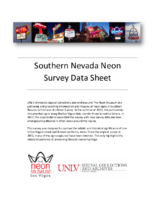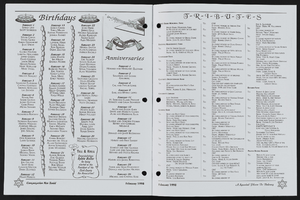Search the Special Collections and Archives Portal
Search Results
Johnny Eshow Haig Papers
Identifier
Abstract
The Johnny Eshow Haig Papers (1970-1990) are comprised of contracts, agreements, and correspondence of musician Johnny Haig, who worked as a trombone player and conductor at various hotels in Las Vegas, Nevada from 1955 until 2000. Additionally, the papers house extensive original music scores written by Haig. The papers primarily cover Haig’s later career in the 1970s and 1980s.
Archival Collection
Las Vegas Professional Men's Club Records
Identifier
Abstract
The Las Vegas Professional Men’s Club Records (1984-1997) consist of the constitution, meeting minutes, and organizational documents of the Las Vegas Professional Men’s Club, later known as the Las Vegas Men’s Club (LVMC). The LVMC provided a social outlet for gay men in Southern Nevada. The bulk of the materials date from the 1990s and include membership lists, event fliers, promotional materials, financial documents, and information documenting the club’s fundraising activities.
Archival Collection
Human Radiation Experiments Records
Identifier
Abstract
The Human Radiation Experiments Records (1949-1995) contain reports from the National Environmental Policy Act (NEPA), the Advisory Committee on Human Radiation Experiments (ACHRE), and the U. S. Department of Energy (DOE). Also included are newspaper clippings, a court case brought by the National Association of Radiation Survivors (NARS), and cancer research papers. With the goal of building an atomic bomb using plutonium extracted from uranium, the material also examines the outcomes of radiation exposure done on humans during the late 1940s and early 1950s at the Oak Ridge Nuclear Facility in Tennessee.
Archival Collection
Robert H. Crabtree papers, 1920 to 1999
Level of Description
Scope and Contents
The Robert H. Crabtree papers (1920-1999) sub-series contains an extensive account of Crabtree's career as a professor and archaeologist. Materials includes correspondence, photographic prints and negatives, reports, and notes of archeological surveys and excavations done in Southern California, Southern Nevada, Washington, Oregon, and Mexico. Collection includes resources such as field catalogs, proposals, newsletters, annual reports, workflow documentation, conference materials, and meeting minutes from various archaeological and anthropological societies and organizations. The subseries also includes class notes, dissertation drafts, and manuscripts used by Crabtree during his academic career. Digital files include field notes and reports.
Archival Collection
Pagination
- Previous page ‹‹
- Page 4
Archival Component

LaPalm Motel Neon Survey document, September 10, 2017
Date
Archival Collection
Description
Site address: 2512 Fremont St
Sign owner: La Palm Motel Inc
Sign details: Property originally constructed in 1963 on 0.33 acres.
Sign condition: 3 - the sign is in decent condition and appears worn from weather. It is unclear if the sign still lights up at night.
Sign form: Roadside pole sign
Sign-specific description: This pole roadside sign has a simple design. A large black pole supports the other elements for this sign. The top portion of the sign features a plastic, backlit sign reading "La Palm" in a black, serif text. Underneath the "lm" of the "La Palm" sign is a series of open channel letters spelling out "MOTEL" against a faded teal background. This portion of the sign is also a thin, rectangular shape allowing for an open space between the "MOTEL" of the sign and the pole that supports it. Underneath the "L" of the "MOTEL" is the bottom portion of the sign that is attached to the pole. This portion of the sign features a plastic, backlit sign reading "DAILY WEEKLY CABLE TV POOL KITCHENETTES LAUNDROMAT" in bold red letters against a white background. Under this is the word "VACANCY" painted in bold white text. Neon tubes spell out "NO" and outline "VACANCY." Along the outer edge of this sign facing Fremont, the sign is painted a pale yellow with incandescent light bulbs lining this section.
Sign - type of display: Neon, indandescent, backlit
Sign - media: Steel and plastic
Sign - non-neon treatments: Paint
Sign environment: This property sits at the corner of East Charleston and Fremont in an area filled with many other smaller motels. There is a Pepe's Taco and Lowe's Home Improvement that close to this motel.
Sign - date of installation: Possibly c. 1963
Sign - thematic influences: There is no exact theme replicated in this sign. It does look similar to other motel signs throughout the city since it sits directly along the roadside allowing motorist and pedestrians to see it easily.
Sign - artistic significance: This sign is a standard example of motel signage because it features the basic elements of a roadside motel sign. It has the name of the property, the word "motel", and other amenities that they may offer.
Survey - research locations: Assessor's website
Survey - research notes: http://www.roadsidepeek.com/roadusa/southwest/nevada/vegas/lvmotel/lvdownmotel/index4.htm
Survey - other remarks: There is not a date of any specific redesign of this sign; however, based on an earlier image of this sign the font in the "La Palm" portion of the sign did change somewhere along the way during the time this property has been around.
Surveyor: Lauren Vaccaro
Survey - date completed: 2017-09-10
Sign keywords: Neon; Incandescent; Backlit; Steel; Plastic; Paint; Pole sign; Roadside
Text
Roger D. Foley Papers on United States v. Cappaert
Identifier
Abstract
The Roger D. Foley Papers on United States v. Cappaert are comprised of materials collected by District Judge Roger D. Foley while performing his duties as judge in
Archival Collection
Kane Springs Ranch Records
Identifier
Abstract
The Kane Springs Ranch Records (1930-2005) contain materials related to the Kane Springs Ranch in Meadow Valley Wash outside of Moapa, Nevada. The collection primarily focuses on the property itself, but also contains a genealogy of the Huntsman family, the ranch's first owners. Records include deeds and materials from the sale of the Kane Springs Ranch to the Bureau of Land Management in 2005. The bulk of the collection documents how the Bradley Stuart family used its resources from 1952 to 2003. These materials are related to water usage on the property and a rock and sand mining operation.
Archival Collection
Larry Ruvo oral history interview
Identifier
Abstract
Oral history interview with Larry Ruvo conducted by David G. Schwartz on January 27, 2009 for the Remembering Jay Sarno Oral History Project. Ruvo begins by discussing his position as a front desk clerk at Caesar’s Palace in Las Vegas, Nevada in the 1970s. Ruvo then describes how Jay Sarno changed the casino industry by designing Caesar’s Palace with a single theme. Ruvo then chronicles how gaming gradually was legalized in more areas throughout the world and how Sarno capitalized on making Caesar’s Palace an iconic casino which made people want to travel to Las Vegas. Lastly, Ruvo discusses Sarno’s focus on offering both gaming and entertainment options for guests at Caesar's Palace.
Archival Collection
Celesta Lowe oral history interview
Identifier
Abstract
Oral history interview with Celesta Lowe conducted by Patrick W. Canlton on February 06, 2002 for the Boyer Early Las Vegas Oral History Project. Lowe begins by discussing her early life in Baker, California and her father’s role as a station agent for the Tonopah Tidewater Railroad during the 1920s and 1930s. Lowe then describes her family moving to Las Vegas, Nevada in the 1940s. Lowe chronicles the process state legislatures took to open Nevada Southern University in 1957 and her role as an administrative assistant in the main office of the school. Lowe recounts her career at Nevada Southern University, the expansion of the campus, and renaming it University of Nevada, Las Vegas. Lastly, Lowe talks about her switch from an administrative assistant to a librarian at UNLV.
Archival Collection

